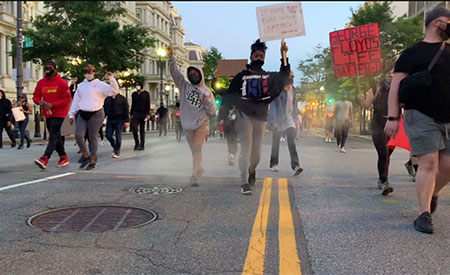 |
|
Protesters march in Washington, DC on Sunday 31 May to demonstrate against police brutality following the murder of George Floyd by police in Minneapolis, Minnesota. SCB stands in solidarity with Black Lives Matter protests in the US and around the world. |
On behalf of the Society for Conservation Biology, the Equity, Inclusion and Diversity Committee expresses our sadness and outrage against ongoing violence against Black people. We all have a right to feel safe in our homes, with our families, in our neighborhoods, our villages, and our cities.
|
---------------------------- "Our disciplines and Society are not immune to the problems of racism and discrimination. White researchers, for example, working in developing countries can create an environment in which local collaborators are made to feel less important." ---------------------------------------------- |
In the United States, there is a particularly grievous practice of extrajudicial killing of Black people by police and (often white) armed individuals that routinely goes unpunished, unacknowledged, and unseen. This violence is the extreme result of many other more subtle forms of racism that permeate cultures around the world. The recent killings of George Floyd, Breonna Taylor, Tony McDade, and Ahmaud Arbery are reminders of racism and discrimination that are tightly embedded in American society. Such acts of violence are often ignored or dismissed by the politicians elected to protect and represent their citizens, regardless of the color of our skin, our religious beliefs, or our chosen appearance. Perpetrators of these injustices must be punished to the highest extent of the law.
We stand in solidarity and support ongoing Black Lives Matter protests around the world. Please see the statement from the SCB North America Section on anti-Black violence in the United States and know that SCB pledges solidarity to Black Lives Matter protests globally.
Beyond the USA, Black Lives Matter (BLM) protests have illuminated the inhumane persecution, violence, and death experienced by Black and other marginalized groups around the world. In Canada, BLM protests the treatment of Black and Indigenous people, including the recent death of Regis Korchiinski-Pacquet in police presence. In the United Kingdom, BLM protests the treatment of Black and immigrant communities. In Australia and Aotearoa New Zealand, BLM protests the treatment of Australian Aboriginal, Maori, and Black communities. Anti-Black racism, however, is not restricted to the western world.
Our disciplines and Society are not immune to the problems of racism and discrimination. White researchers, for example, working in developing countries can create an environment in which local collaborators are made to feel less important. Persistent barriers to conservation jobs reduce representation and equal opportunities of employment. Non-white voices are often marginalized in conservation decisions around the world. The EID committee works with SCB towards a Society and science that is intertwined with and relies on a commitment to greater access, inclusion, and empowerment of humans of many views, vantage points, identities, and geographies who actively participate in conservation with equal opportunity and access at all levels of the Society’s structure.
The EID committee is committed to working towards greater equity and inclusion in conservation and supports the protests against these crimes and against racism around the world.